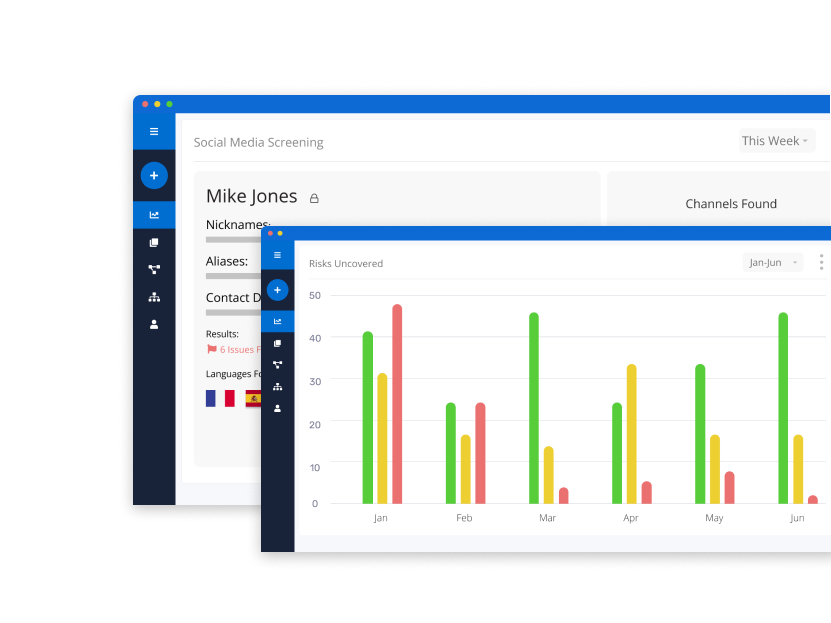Screening peoples’ social media activity for behavioural and reputational risks.

In today's digital age, a person's online presence has become an integral part of their identity. Social media platforms, blogs, forums, and other online activities offer a glimpse into an individual's personality, beliefs, and behavior. This has prompted businesses to recognise the importance of evaluating a candidate's online reputation as part of the recruitment process. Online reputation screening has emerged as a powerful tool to gain deeper insights into candidates beyond what their resume and interviews reveal.
Online reputation screening involves the systematic review of a candidate’s digital footprint. This encompasses their activities on social media platforms, personal blogs, online forums, and any other online spaces where they have engaged in discussions, shared content, or expressed opinions. The goal is to uncover information that might not be visible in a traditional job application but could impact their suitability for a role or compatibility with a company’s culture.
Online Reputation Screening enables companies to assess candidates' alignment with company values, mitigate potential risks, and ensure a positive cultural fit, fostering effective and harmonious workplaces.
Cultural Fit: Companies invest significant resources in fostering specific work cultures. Online reputation screening allows employers to gauge whether a candidate’s values align with those of the organisation. This helps ensure that new hires seamlessly integrate into the company’s environment and contribute positively to its growth.
Risk Mitigation: Inappropriate or offensive online behavior can harm a company’s reputation. By identifying any red flags during the screening process, employers can proactively avoid potential PR crises or conflicts down the line.
Skill Verification: Online activities can provide evidence of a candidate’s skills and interests. For instance, a programmer who actively participates in coding forums or contributes to open-source projects demonstrates their expertise beyond what’s listed on a resume.
Insight into Communication Skills: How a candidate communicates online can reflect their communication skills, professionalism, and ability to engage effectively with colleagues, clients, and customers.
Ethical Considerations: Ethical behavior is paramount in any workplace. By analysing a candidate’s online interactions, employers can assess their ethical stance and determine if it aligns with the company’s values.
Privacy Concerns: Balancing the need for information with respect for candidates’ privacy is crucial. Employers must follow ethical guidelines and legal regulations to ensure that their screening practices are fair and transparent.
Context Matters: Online content can often be taken out of context, leading to misinterpretations. It’s essential to delve deeper into the content to understand the intent and circumstances behind it.
Unconscious Bias: Just as in traditional recruitment, there’s a risk of unconscious bias when interpreting online content. Employers must be aware of their biases and strive for objectivity during the screening process.
Online reputation screening has evolved from being a novel concept to a valuable tool in the modern recruitment landscape. It helps employers make more informed decisions, reduce risks, and ensure the cultural fit of potential hires. However, it's essential to approach this practice with sensitivity, adhering to privacy regulations and ethical standards. By harnessing the power of online reputation screening while being mindful of its limitations, businesses can enhance their recruitment strategies and build teams that thrive in today's interconnected digital world.
Clear Guidelines: Establish well-defined guidelines for online reputation screening. Determine what type of content is relevant to the job role and what constitutes a red flag.
Consistency: Apply the screening process consistently to all candidates to ensure fairness and avoid potential discrimination claims.
Informed Decision-Making: Use the insights gained from online reputation screening as supplementary information, not the sole basis for hiring decisions. Combine these findings with other evaluation methods, such as interviews and skills assessments.
Our clients can choose to use our advanced technology to interrogate vast data sources using their own methodologies. Our team of in-house expert analysts can also produce reports for you.
Enhance your decision-making with social media screening. Gain insights into candidates’ online presence while upholding privacy, transparency, and fairness in the evaluation process.
Improve analyst efficiencies, including cost and time reduction of minimum 25% with zero false positives.
The FCA recommends open source Internet checks as best practice (FG 18/5). Manage and reduce risk by incorporating 100% of online sources into your processes.
Manage risk with hyper accurate ongoing monitoring. We will monitor 100% of publicly available online data to help identify relevant risks.
Try Neotas Due Diligence Platform Today! Enhance hiring with efficient social media screening. Gain insights into candidates’ online presence to make informed decisions. Streamline recruitment and safeguard company culture.























The Neotas Platform covers 600Bn+ archived web pages, 1.8Bn+ court records, 198M+ corporate records, global social media platforms, and 40,000+ media sources from over 100 countries to help you build a comprehensive risk assessment of individuals, entities, and their networks.
Neotas Platform covers 600Bn+ archived web pages, 1.8Bn+ court records, 198M+ corporate records, global social media platforms, and 40,000+ Media sources from over 100 countries to help you build a comprehensive picture of the team.
| Cookie | Duration | Description |
|---|---|---|
| AWSALBTG | 7 days | AWS Application Load Balancer Cookie. Load Balancing Cookie: Used to encode information about the selected target group. |
| AWSALBTGCORS | 7 days | AWS Classic Load Balancer Cookie: Used to map the session to the instance. This cookie is identical to the original ELB cookie except for the attribute &SameSite=None; |
| cookielawinfo-checkbox-advertisement | 1 year | Set by the GDPR Cookie Consent plugin, this cookie is used to record the user consent for the cookies in the "Advertisement" category . |
| cookielawinfo-checkbox-analytics | 11 months | This cookie is set by GDPR Cookie Consent plugin. The cookie is used to store the user consent for the cookies in the category "Analytics". |
| cookielawinfo-checkbox-functional | 11 months | The cookie is set by GDPR cookie consent to record the user consent for the cookies in the category "Functional". |
| cookielawinfo-checkbox-necessary | 11 months | This cookie is set by GDPR Cookie Consent plugin. The cookies is used to store the user consent for the cookies in the category "Necessary". |
| cookielawinfo-checkbox-others | 11 months | This cookie is set by GDPR Cookie Consent plugin. The cookie is used to store the user consent for the cookies in the category "Other. |
| cookielawinfo-checkbox-performance | 11 months | This cookie is set by GDPR Cookie Consent plugin. The cookie is used to store the user consent for the cookies in the category "Performance". |
| CookieLawInfoConsent | 1 year | Records the default button state of the corresponding category & the status of CCPA. It works only in coordination with the primary cookie. |
| debug | never | Cookie used to debug code and website issues |
| shown | session | Session cookie to control number of times a pop up is shown. |
| viewed_cookie_policy | 11 months | The cookie is set by the GDPR Cookie Consent plugin and is used to store whether or not user has consented to the use of cookies. It does not store any personal data. |
| Cookie | Duration | Description |
|---|---|---|
| __cf_bm | 30 minutes | This cookie, set by Cloudflare, is used to support Cloudflare Bot Management. |
| AnalyticsSyncHistory | 1 month | Used to store information about the time a sync took place with the lms_analytics cookie |
| bcookie | 2 years | LinkedIn sets this cookie from LinkedIn share buttons and ad tags to recognize browser ID. |
| bscookie | 2 years | LinkedIn sets this cookie to store performed actions on the website. |
| lang | session | LinkedIn sets this cookie to remember a user's language setting. |
| lidc | 1 day | LinkedIn sets the lidc cookie to facilitate data center selection. |
| UserMatchHistory | 1 month | LinkedIn sets this cookie for LinkedIn Ads ID syncing. |
| Cookie | Duration | Description |
|---|---|---|
| li_gc | 2 years | Used to store consent of guests regarding the use of cookies for non-essential purposes |
| rl_anonymous_id | 1 year | Generates an unique anonymous Id to identify a user and attach to a subsequent event. |
| rl_user_id | 1 year | to store a unique user ID for the purpose of Marketing/Tracking |
| Cookie | Duration | Description |
|---|---|---|
| _ga | 2 years | The _ga cookie, installed by Google Analytics, calculates visitor, session and campaign data and also keeps track of site usage for the site's analytics report. The cookie stores information anonymously and assigns a randomly generated number to recognize unique visitors. |
| _gat_gtag_UA_107495977_1 | 1 minute | Set by Google to distinguish users. |
| _gat_UA-107495977-1 | 1 minute | A variation of the _gat cookie set by Google Analytics and Google Tag Manager to allow website owners to track visitor behaviour and measure site performance. The pattern element in the name contains the unique identity number of the account or website it relates to. |
| _gcl_au | 3 months | Provided by Google Tag Manager to experiment advertisement efficiency of websites using their services. |
| _gid | 1 day | Installed by Google Analytics, _gid cookie stores information on how visitors use a website, while also creating an analytics report of the website's performance. Some of the data that are collected include the number of visitors, their source, and the pages they visit anonymously. |
| attribution_user_id | 1 year | This cookie is set by Typeform for usage statistics and is used in context with the website's pop-up questionnaires and messengering. |
| CONSENT | 2 years | YouTube sets this cookie via embedded youtube-videos and registers anonymous statistical data. |
| Cookie | Duration | Description |
|---|---|---|
| _fbp | 3 months | This cookie is set by Facebook to display advertisements when either on Facebook or on a digital platform powered by Facebook advertising, after visiting the website. |
| fr | 3 months | Facebook sets this cookie to show relevant advertisements to users by tracking user behaviour across the web, on sites that have Facebook pixel or Facebook social plugin. |
| IDE | 1 year 24 days | Google DoubleClick IDE cookies are used to store information about how the user uses the website to present them with relevant ads and according to the user profile. |
| test_cookie | 15 minutes | The test_cookie is set by doubleclick.net and is used to determine if the user's browser supports cookies. |
| VISITOR_INFO1_LIVE | 5 months 27 days | A cookie set by YouTube to measure bandwidth that determines whether the user gets the new or old player interface. |
| YSC | session | YSC cookie is set by Youtube and is used to track the views of embedded videos on Youtube pages. |
| yt-remote-connected-devices | never | YouTube sets this cookie to store the video preferences of the user using embedded YouTube video. |
| yt-remote-device-id | never | YouTube sets this cookie to store the video preferences of the user using embedded YouTube video. |
| yt.innertube::nextId | never | This cookie, set by YouTube, registers a unique ID to store data on what videos from YouTube the user has seen. |
| yt.innertube::requests | never | This cookie, set by YouTube, registers a unique ID to store data on what videos from YouTube the user has seen. |